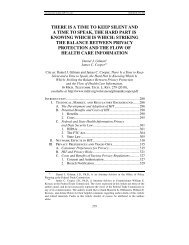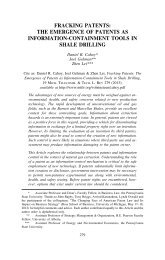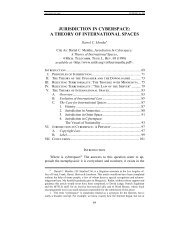the chinese regulatory licensing regime for pharmaceutical products
the chinese regulatory licensing regime for pharmaceutical products
the chinese regulatory licensing regime for pharmaceutical products
You also want an ePaper? Increase the reach of your titles
YUMPU automatically turns print PDFs into web optimized ePapers that Google loves.
448 Michigan Telecommunications and Technology Law Review [Vol. 15:417<br />
4. Special Approval Procedure<br />
The special approval procedure stipulates shorter time limits <strong>for</strong> <strong>the</strong><br />
SFDA to approve an NDC application, 173 and can, at most, save 50 working<br />
days from <strong>the</strong> approval process. 174 As a general principle, <strong>the</strong> Chinese<br />
government encourages innovation in new drugs and applies <strong>the</strong> special<br />
approval procedure to original new drugs or new drugs that treat serious,<br />
complicated or fatal diseases. 175 Specifically, <strong>the</strong> SFDA may apply <strong>the</strong><br />
special approval procedure to applications <strong>for</strong> <strong>the</strong> following: (1) active<br />
ingredients and <strong>the</strong>ir <strong>pharmaceutical</strong> preparations made from any plant,<br />
animal, mineral, or o<strong>the</strong>r raw material, including newly-discovered crude<br />
herb medicines and <strong>the</strong>ir preparations, provided that <strong>the</strong>y have not been<br />
previously marketed in China; (2) chemicals, preparations containing<br />
such chemicals, and biotechnology <strong>products</strong>, provided that <strong>the</strong>y have not<br />
been authorized <strong>for</strong> marketing in China or any o<strong>the</strong>r country; (3)new<br />
drugs used to diagnose, treat, or prevent AIDS, or to treat malignant tumors<br />
or rare diseases; and (4) new drugs used to treat diseases without<br />
effective cures. 176 Upon receipt of an application that qualifies <strong>for</strong> <strong>the</strong><br />
special approval procedure, <strong>the</strong> CDE will arrange an expert committee to<br />
make a decision. 177<br />
The special approval procedure may be reasonably justified if <strong>the</strong><br />
reduction in delay costs exceeds <strong>the</strong> potential increase in errors and o<strong>the</strong>r<br />
administrative costs. The third and fourth categories of drugs are usually<br />
urgently needed to treat patients with serious or life-threatening conditions.<br />
Even though a universal schedule would result in similar approval<br />
time <strong>for</strong> all drugs, a longer approval process <strong>for</strong> those categories would<br />
entail much greater delay costs. There<strong>for</strong>e, in order to reduce <strong>the</strong>se significant<br />
delay costs, use of <strong>the</strong> special approval procedure is normally<br />
justified. However, adoption of <strong>the</strong> special approval process may be inappropriate<br />
with respect to <strong>the</strong> first and second categories of drugs<br />
because <strong>the</strong> normal approval process will not generate delay costs as<br />
great as those <strong>for</strong> <strong>the</strong> third and fourth categories of drugs. If Chinese<br />
lawmakers aim to encourage innovation with <strong>the</strong> adoption of <strong>the</strong> special<br />
approval process <strong>for</strong> <strong>the</strong> first and second categories of drugs, <strong>the</strong>y must<br />
also be aware of <strong>the</strong> possibility of increased error costs due to <strong>the</strong> shorter<br />
time period <strong>for</strong> <strong>the</strong> SFDA to make decisions. In fact, Chinese lawmakers<br />
can rely on patent law and o<strong>the</strong>r <strong>regulatory</strong> arrangements to encourage<br />
innovation with reduced social costs. A more precise analysis of this<br />
173. See supra Chart 2, steps 4, 4A.<br />
174. See Provisions <strong>for</strong> Drug Registration, supra note 118, arts. 45, 150–51.<br />
175. Id. art. 4.<br />
176. Id. art. 45.<br />
177. Id.






